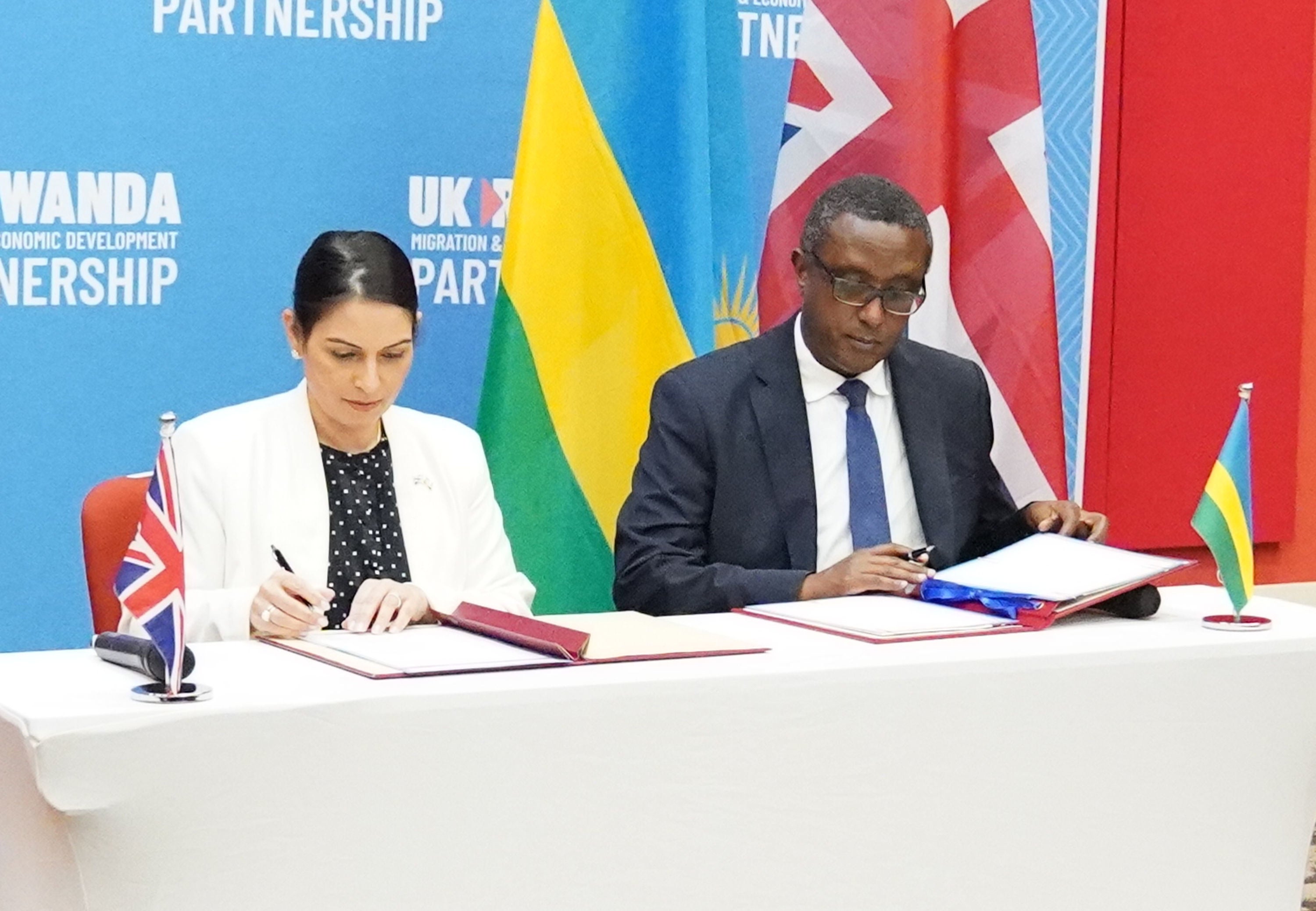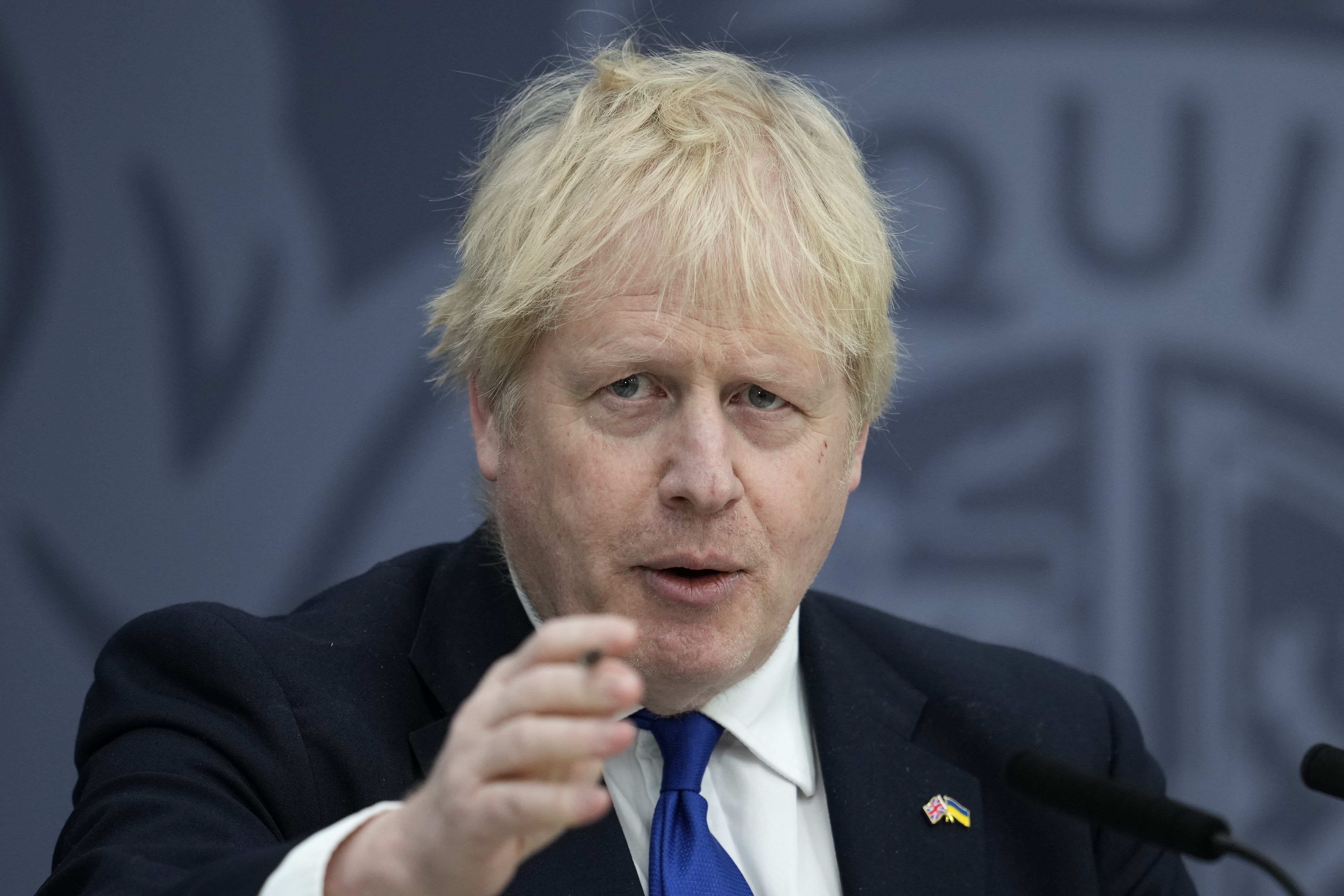
Boris Johnson and Priti Patel have set out widely criticised plans to fly migrants who cross the Channel in small boats more than 4,000 miles to Rwanda.
The eye-catching scheme announced on Thursday comes after the Home Secretary has come under sustained pressure to stop asylum seekers making the perilous journeys.
And it comes as the Prime Minister battles to hold on to his job after being fined by police for breaching his own coronavirus laws.

Here is a look at what is known about the immigration plans, so far.
– How many people will be removed to Rwanda?
Mr Johnson has said the agreement is “uncapped” and that Rwanda will have the “capacity to resettle tens of thousands of people in the years ahead”.
But officials were putting that figure at closer to thousands in the first years.
– Who will be removed?
Ms Patel said the “vast majority” of those who arrive in the UK through means deemed “illegal”, such as on unauthorised boats or stowed away in lorries, will be considered for relocation.
Reports have suggested only male migrants who arrive from safe countries will be eligible but the Home Secretary declined to give further details.
It is understood that adults will be prioritised for relocation under the scheme, with officials insisting that families arriving in the UK will not be split up.
– How much will the scheme cost?
The taxpayer will foot the bill, including for the cost of chartering flights to remove detainees, but ministers are not saying how much the programme will cost.

Britain has promised Rwanda an initial £120 million as part of an “economic transformation and integration fund” but the UK will be paying for operational costs too.
The Home Office said a set amount of funding will be provided for each relocated person.
But it declined to say how much, other than to say it will be comparable to current processing costs in the UK and cover case workers, legal advice, translators, accommodation, food and healthcare.
For those who successfully claim asylum in Rwanda, it will fund an integration package to help them put down roots.
The agreement struck with Rwanda also says Britain will resettle “a portion of Rwanda’s most vulnerable refugees” in the UK.
The Refugee Council has claimed costs could soar to £1.4 billion, citing a Together With Refugees report based on the Australian offshore processing system.
But the Home Office questioned the figure, with a source saying it was “ludicrous to suggest costs would be more than the current system”.
– How will it work?
Once migrants are brought ashore in Dover by Navy and Border Force personnel they will receive medical assessments before being taken to the Manston disused airfield and processing site.
Those deemed to have entered by dangerous or illegal means will be detained and considered for removal to Rwanda under a screening process.
Not only is it designed to exempt those with relevant vulnerabilities or safeguarding risks, but Rwanda has to approve any requests and has made clear it would reject any individuals with criminal records.
Those seeking asylum from Rwanda are not expected to be sent back there, regardless of how they entered the UK.
The migrants will be sent by chartered flight to Rwanda where they will be housed in temporary accommodation, not detained, and have their asylum claims assessed.
If they are not granted refugee status, they will be given the option of applying to stay under another basis.
– What’s the point?
Mr Johnson accepted the measure is not a “magic bullet” that will solve the crossings but hopes it will be a “very considerable deterrent”.
And he wants it to break the business model of the “vile people smugglers” who risk turning the Channel into a “watery graveyard”.
But refugee charities argued the plans do nothing to alleviate the pressures forcing migrants to take the extraordinary step of paying criminals to pack them into unsafe boats to cross a perilous shipping lane.
– When will it start and how long is the deal for?
Mr Johnson said he was braced for the policy to be challenged in the courts, as he criticised a “formidable army of politically motivated lawyers” who want to “thwart removals”.
But officials expect the scheme will start in the coming weeks, with people on flights within months.
The arrangement between the UK Government and Rwanda will last for five years, the agreed memorandum of understanding says.
But they have retained the option to renew the scheme a year from its scheduled end.
– Is Rwanda safe?
Rwanda is one of the safest countries in the world, according to Mr Johnson, while Ms Patel said it is a “safe and secure country with the respect for the rule of law”.
But critics have aired their concerns over the African nation’s “dismal” and “questionable” human rights record.
A Human Rights Watch report published last year found evidence that Rwandan authorities had arbitrarily detained over a dozen gay and transgender people ahead of a June 2021 conference, accusing them of “not representing Rwandan values”.
According to the Foreign Office, homosexuality “remains frowned upon by many” and LGBT people can experience discrimination and abuse, including from local authorities.
The travel advice page describes the country as “generally safe” with relatively low crime levels, but the situation near the border with the Democratic Republic of Congo (DRC) and Burundi remains unstable, and there have been armed attacks in some areas.
– What about the Navy?
Separate to the removal of migrants, Mr Johnson handed over operational control of the English Channel to the Navy to ensure “no boat makes it to the UK undetected”.
Around 250 to 300 military personnel will be dedicated to police migrants in the English Channel on busy days, it is understood.
They will work on ships and aircraft and will include Army personnel, freeing up Border Force staff for processing.
The Ministry of Defence was expected to provide a range of boats and surveillance planes and drones, including one offshore patrol vessel, up to six Archer-class patrol vessels and one Wildcat helicopter.







